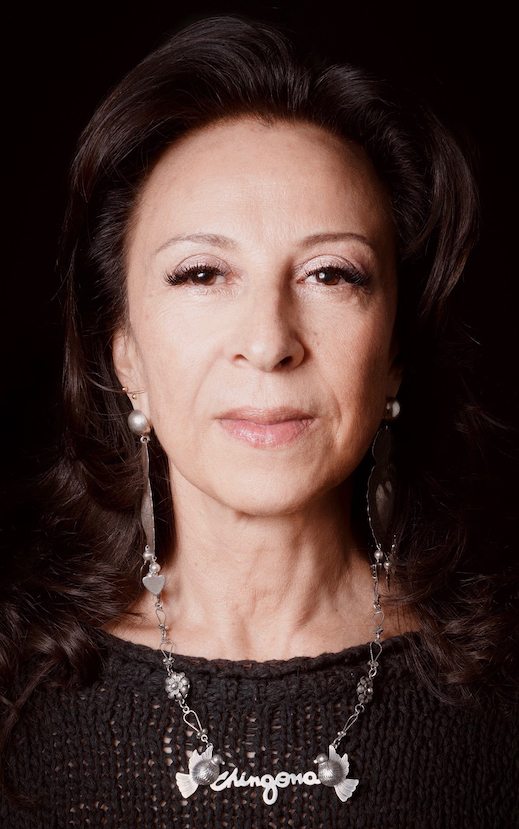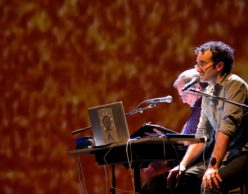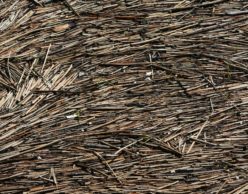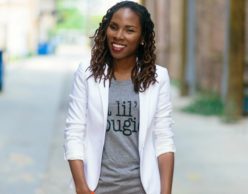Maria Hinojosa On Never Giving Up
![[Image Description: Photo of a Mexican American woman smiling at the camera. She has layered brown hair that rests below her shoulders and wears a sleeveless navy blue shirt, and silver earrings. Behind her are colorful framed photographs and artwork.] Photo Credit: Columbia Spectator, Michael Cao](https://www.mashupamericans.com/wp-content/uploads/2021/02/MariaHinojosa_030521_EDITED_1d.jpg)
Every culture has its legends and Mash-Up America is no exception. Maria Hinojosa is an award-winning journalist, and founder and CEO of the Harlem-based Futuro Media Group, which produces the show Latino USA, and co-host of Futuro’s In The Thick. Over the past 30 years, she has reported for PBS, CBS, WNBC, CNN, NPR. She was the first Latina to anchor a PBS FRONTLINE report, among many other firsts. She has been awarded four Emmys, the John Chancellor Award, the Studs Terkel Community Media Award, two Robert F. Kennedy Awards, the Edward R. Murrow Award, and the Ruben Salazar Lifetime Achievement Award. In 2020, she released her memoir, Once I Was You: A Memoir of Love and Hate in a Torn America. Maria recently spent an afternoon with The Mash-Up Americans to talk about family, stepping into her power, and the next generation of journalists.
You’ve talked about being the first Latina in many of the newsrooms you entered over the past few decades. What were some of the most important things to you about writing your memoir?
I think when when you set out to write a memoir, it’s mostly about trying to be as honest as you possibly can be. That’s what I set out to do: let me try to go as deep as I possibly can, in my memories around these issues, about immigration, journalism, media, my life as a woman, my life as an immigrant, as an American, as a Mexican. One of the issues that I ended up touching on was discussing the imposter syndrome. You know, when I went from my public high school, that was almost majority Black, and where there was all kinds of different economic backgrounds, to go into a private high school, where Black Americans were a teeny fraction, there were no Latinos — maybe one or two other families in the entire school. And so that’s when I started to have this notion of, “Do I belong here?” I could have dropped it there. But then I realized, wait a second, this follows me when I’m the first Latina hired in this newsroom, at NPR. And I’m able to talk about these things because I’m secure in who I am. And really what I’m trying to say is see your own power. It doesn’t happen overnight. But please begin to see yourself in a sense of power, and not in the invisibility and in the imposter syndrome that can just overwhelm us.
After Donald Trump was finally suspended on Twitter, you joked that you were still on Twitter while he wasn’t. Even though it was a joke, what does it mean to you to “still be here”?
I actually thought about deleting that tweet, but then I was like, “You know what?” I still have what I consider a very tiny audience, close to 100,000. And I’m like, still, that’s 100,000 people who I have an interaction with, and that has only grown and is going to continue to grow. And Donald Trump’s is cut off now. And I have a love hate relationship with Twitter. I enjoy going on and seeing what other people are saying, and interacting with people. And I have to realize, I get to do that, he doesn’t anymore. I was like, well, this is really silly, making a joke over Twitter. But at the same time, it’s very serious, right?
Let me be clear, I am quite distressed about everything that is happening right now, deeply distressed. And part of the distress is that we are not all in the same universe, we are not. It is not the first time that the United States lives in parallel universes. But this level of propaganda, misuse of media, out and out lies, manipulation, demagogues… I’m just like, What happened here? And that is the part that really disturbs me. I have to spend more time talking with people who have lived through that kind of residual of authoritarianism to understand how we’re going to resolve this. And that’s the scary part for me.

We’re all processing 2020. You survived COVID, you published your memoir. What are you carrying forward into 2021?
I’m actually going to be in the next season of Finding Your Roots with Skip Gates. So a lot was just revealed to me, which I can’t reveal just yet. But one of the things that did come up is that it is a mash-up. It is a pretty violent mash-up, too. And so I’m trying to connect very deeply with my own Indigenous roots. And part of what I’m doing now when I’m running, is occasionally tagging #nativewomenrunning, because I want to be very conscious of where I’m running. I’m in Connecticut now in the hills and Indigenous people were here. And I’m here now. We are here.
You are here. And you are a product of all of that work. And don’t be afraid to feel that.
And that is one of the things I tell my students, you know, because I also am a professor (because I’m an immigrant, so I have 16 jobs). And I’m just like, you all are the survivors, you are the ones who are here at 9 am taking this class with me. You made it through, you got accepted. You are here. And you are a product of all of that work. And don’t be afraid to feel that. It’s necessary. I think it’s just necessary for me to feel like I can continue to move forward. Like right now, just looking out onto trees and sky and the birds who have visited me throughout the day, and just knowing, “This has been here hundreds and hundreds of years, so have our ancestors. So we’re gonna be here.”
We are going to hold onto that. Are there other mantras you hold on to?
One of my favorite sayings in Spanish is, “No hay mal que por bien no venga,” which means there is no bad from which good cannot come. And I even like translating it that way, which is a little bit more cumbersome, but that is the translation. And I do feel that way, almost all the time. This pandemic has been pretty horrible. I am a survivor, and my husband, we believe, is also a survivor of COVID, because I gave it to him. And so, you know, we made it to the other side. We lost too many people to even begin to count, between he and I. And it’s been really tough. And I think we will not forget the strength that we all learned. That’s one of the things that I’ve been saying to my students, to my staff, to my own family, is that we are a lot stronger than we thought, right? If you would have told us, “You’re going to have to shut everything down. And you’re not going to be going out at all or flying anywhere. For over a year. You know, we would have been like, “Yeah, sure. Try that.” We have survived this. We’re stronger than we think.
In the PBS series America by the Numbers with Maria Hinojosa, you focused on documenting the rapidly shifting demographics in the U.S., and the impacts of these newer generations on elections, media, and culture. You’ve also been encouraging of people with Mash-Up identities to embrace their full selves, and the strengths and the lessons that they carry.
Every day. And I feel like our adult children, in fact, have seen a benefit to that: the Mexican-ness, and the Dominican-ness. My husband couldn’t be more different than me. I was raised in the United States, even though I was born in Mexico. My husband was born and raised in the Dominican Republic. He is Afro-Taíno. He is a multimedia artist, he is about imagining another space. He’ll write a script, he’ll sing, he’ll perform, he’ll go do painting, or he’ll produce something on glass. And I am often the journalist, right, who’s kind of based in reality. We still have these conversations. I’m always now in a different kind of border, you know, talking to different people, communicating. And I feel like that’s one of the things that I can do well, is to speak to people from any kind of background, about anything. And that’s one of the things that I get, and that I internalized, from being this person who had multiple identities.
Your career has highlighted the power of bringing your own particular lenses to your work, especially in the fields of journalism and media. What would you share with young journalists or media creators?
I read a seminal book, for me, called News for All the People, by Juan González and Joe Torres. And it is the history of journalists of color in the United States and our role in the United States media and journalism. When I was able to understand that my role as an American journalist is precisely tied to the fact that I am an immigrant, I am a Latina, I am Mexican-born, I am a woman, I am a Chicagoan, a South-sider, all of these things. Then it became clear: You have ties to Ida B. Wells. And also ties to Frederick Douglass. Now, I begin to understand that my work is part of the responsibility that we have as journalists of color and of conscience. And you do not have to be a journalist of color to be a journalist of conscience.
We have a responsibility to tell these truths. If you as a young journalist can begin to understand how essential your role is in American history… At this point in my career, I speak out a lot more because I can and I should, and I have to. I also see that as part of my responsibility. But as a younger journalist, do the work, get out there and hone the skills, do the best journalism that you can with heart. And don’t give up. It’s really hard. But when you understand that you do this, because of this responsibility, and you’ve got this passion, it should make it easier.
You do not have to be a journalist of color to be a journalist of conscience. We have a responsibility to tell these truths.
And again, it is not easy. It is not easy in any stretch of the imagination to leave a job, go create something, battle the imposter syndrome, all of it, it’s not easy. But if this is something that you love, and that you really feel, then we need you, then this country actually needs you. And we need you to be the most ethical journalist that you can be. So talk to people about what that looks like and what that means. So you can be prepared. Our profession is dwindling in the world and in this country, and so please don’t give up.





